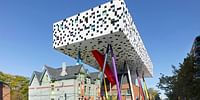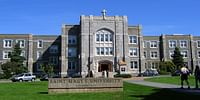- Physics is the study of matter and energy at all scales, from the sub-nuclear to the dimensions of the universe. It is the fundamental science — all other sciences and technologies rely on the principles of physics. Physics involves observing and understanding natural phenomena. It is evident in the world around us in everything from the seasons, the motion of objects, the flight of birds, the night sky and the weather, to lasers, electronics and the technology we rely on today.
- Physics is very much a “hands-on” science, so the most effective way for students to learn the subject is to actually do physics. Astronomy teaches them how to study objects at a distance and interpret the information gathered. This helps to understand the universe one lives in. The skills students will learn in astronomy are also applicable to remote sensing and its application to environmental problems.
- If students GPA is high enough in their fourth year, they can opt to complete an Undergraduate Thesis course. This is an excellent opportunity for them to earn an “Honours Thesis” designation on their degree.
Bachelor of Science [B.S]/Bachelor of Management [B.Mgmt] (Physics)
5 years
Co Op, On Campus & Dual Degree
English
CA$24,068/Yr
CA$24,068 /Yr
Important Dates
| Event | End Date |
| Application Deadline For Fall Intake | Jun 15, 2023 |
| Application Decision Deadline For Fall Intake | Jun 30, 2023 |
| Application Deadline For Spring Intake | Sep 15, 2023 |
| Application Decision Deadline For Spring Intake | Sep 15, 2023 |
Fees & Funding
Tution & Application Fees
| Year | Year 1 | Year 2 | Year 3 | Year 4 | Year 5 |
| Tuition Fees | CA$20290 | CA$20290 | CA$20290 | CA$20290 | CA$20290 |
| Health Insurance | CA$717 | CA$717 | CA$717 | CA$717 | CA$717 |
| Books and supply | CA$2500 | CA$2500 | CA$2500 | CA$2500 | CA$2500 |
| Other Fees | CA$561 | CA$561 | CA$561 | CA$561 | CA$561 |
| Total Fees | CA$24068 | CA$24068 | CA$24068 | CA$24068 | CA$24068 |
Eligibility & Entry Requirement
- Applicants who have completed secondary qualifications in other countries will be considered for admission under the High School Admission Route.
- Applicants to undergraduate programs who have completed post-secondary study will be considered for admission under the Post-Secondary Admission Route.
Scores Required
Ask your question
Similar Colleges You Might Be Interested In
- Similar Colleges
No Ratings Found!!
Follow
No Ratings Found!!
Follow
No Ratings Found!!
Follow
No Ratings Found!!
Follow




.jpeg?tr=h-100,w-200,c-force)


